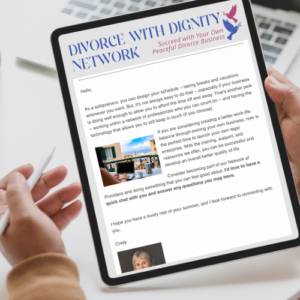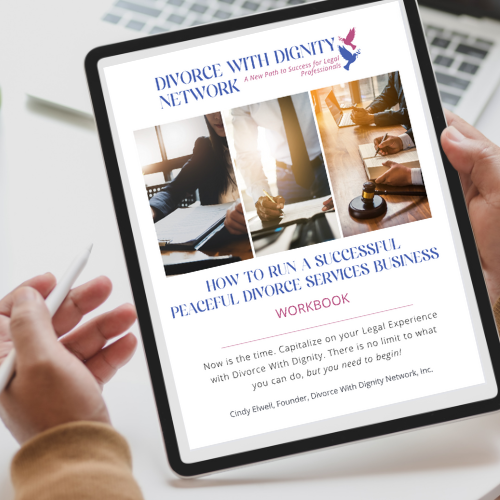It’s not much of a question. Remote meetings with our clients, whether through Zoom, Skype, Facetime, or other media, is here to stay. Remote meetings were essential during the pandemic (don’t worry, we know you don’t want to think about that anymore — this is the last time we mention it, so you can keep reading), and the ease and convenience of a Zoom conference appealed to many people after restrictions were lifted.
There are many advantages to virtual mediation and conferencing. However, in family law, where so much of our work depends on interpersonal contact, there are drawbacks. If you want to use the virtual method of client outreach, keep these disadvantages in mind, as well as the appealing advantages.
Zooming Forward
The biggest advantage to virtual meetings is convenience. How many times have you and a client tried to schedule your next session around your other clients, their child’s soccer game, an upcoming business meeting, and a dentist appointment? Virtual appointments let you schedule a meeting for that one time you’re both free, even if it’s 3:30 Tuesday afternoon.
Coupled with convenience is removal of physical barriers. If your client is free Tuesday afternoon, but only because they have an hour free between the dentist appointment and retrieving the child from school, they won’t have time to drive to your office and back. They will have time to log into Zoom and meet with you virtually.
Convenience in time and space is ideal for mediations, depositions, and negotiations over support and visitation matters. Clients can attend even if they’re in different cities or different states. Individuals who are ill or disabled won’t be forced to travel or sit in uncomfortable offices. In situations where safety is an issue, virtual meetings are an absolute must.
For mediators and Providers who are just starting out, virtual sessions have the advantage of lower cost. There is no need for office space, conference rooms, or travel. Parties can remain at home if necessary. The only cost is a secure platform or VPN. Zoom offers end-to-end encryption, secure breakout rooms so a mediator or attorney can speak with clients individually, and other privacy and security features.
Overall, there are tremendous benefits to virtual family law sessions. If you’re just starting out, having your sessions remotely is a good way to build your client base. Family law practitioners who handle contentious cases might want to add it to their practice as an alternative to having negotiations in courthouses or other secure locations.
Glitches in the Matrix
Now the bad news. There are serious downsides to virtual meetings. They are not so serious you should not consider using Zoom or other remote methods, but you should be aware of the potential risks before starting your virtual practice.
Mediators, negotiators, and therapists all rely on non-verbal communication when practicing their trade. Virtual meetings limit what you can see of a client or opponent to their face and a bit of their upper body (at best). Lags in streaming mean your personal contact is sharply reduced.
Establishing rapport requires a different set of skills on a Zoom link than it does in person. Reading the non-verbal cues mediators use to establish connections and break through deception takes longer and requires some practice, but it can be done.
Some mediators and attorneys have found that the things that make remote mediation so convenient–the low cost and lack of travel–can make the parties less committed to the outcome. It’s unfortunate but true that people sometimes work harder on something expensive or difficult than something that seems easy. Paying a mediator hundreds of dollars or flying to another city requires more “effort” than a Zoom call.
This can be overcome by an honest discussion with the clients about the purpose of the mediation and the importance of commitment on all sides. Stress the need to pay as much attention as if the meeting was taking place in person in an office or courthouse. For instance, remind clients that during breakout sessions, they should not be watching the game or taking other phone calls. They need to remain focused on the effort at hand.
A virtual meeting only works if everyone is present and hears everyone else. That means everyone must have a working computer or tablet and a solid internet connection. As anyone knows who has been on a conference call with members that keep losing their signal, nothing destroys a meeting’s flow like someone constantly asking, “I’m sorry, I lost the signal, can you repeat that?” For mediation or negotiation, dropped signals can spell the end of your session, and possibly the end of the mediation.
When you attempt a mediation or other family law session by Zoom, you must be sure everyone has a working internet connection before you begin. Preferably well before you begin. If anyone does not have a reliable connection, do not schedule the meeting until one can be obtained. Never schedule a meeting on someone’s assurance that “they’ll have it worked out” by the meeting date.
Virtually Speaking
There are drawbacks to virtual meetings and mediation, but they’re not fatal. With some practice and forethought, you can make Zoom and other remote platforms work for you. Reach out to other Practitioners who have experience with virtual sessions and find out what works and what doesn’t work. Online groups in other disciplines have tips for remote meetings, and often have networking sessions that anyone can join.
The Divorce With Dignity Network is here to help you develop your craft as we move into the virtual era. The critical thing is supporting your clients on their terms and in the way that best supports them. At the same time, you must care of your own work/life balance and ensure your needs are met. Virtual sessions give you the extra hours without bending time and space or traveling at warp speed.
Zoom meetings and virtual mediation are part of the future of family law. Let us help you make that part of your strategy. Join us and become part of the Divorce With Dignity Network. Schedule your complimentary Success-Strategy Consultation today!





